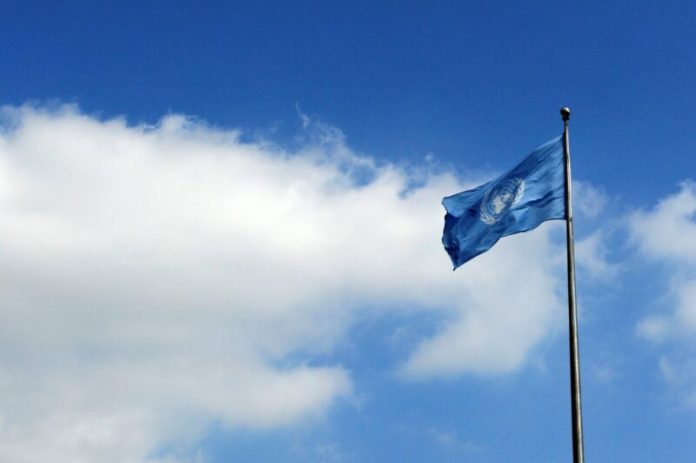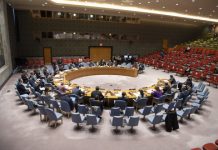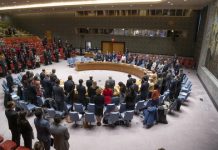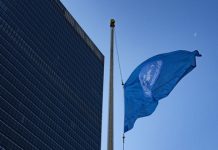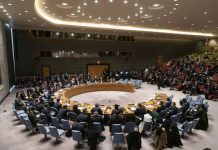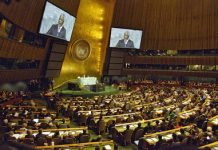UN’s Guterres calls for peace in Gaza, one year since war erupted
One year to the day since Hamas-led terror attacks on multiple Israeli communities prompted an unprecedented Israeli military campaign in Gaza with fears growing of an all-out regional war, the UN Secretary-General has insisted the fighting must stop and that all hostages are released.
In a message marking the day he called on the international community to utterly condemn the initial attack:
“Since 7 October, a wave of shocking violence and bloodshed has erupted. The war that has followed the terrible attacks of one year ago continues to shatter lives and inflict profound human suffering for Palestinians in Gaza, and now the people of Lebanon…It is time for the release of the hostages. Time to silence the guns. Time to stop the suffering that has engulfed the region. Time for peace, international law and justice.”
In Gaza, where 41,000 people have been killed in the last 12 months, UN humanitarians continued to warn that hundreds of thousands of people across the enclave are still being forcibly displaced.
UNRWA, the UN aid agency for Palestine refugees, said that Israeli military operations have intensified and that Gazans face fresh evacuation orders.
There’s also heavy rain, flooded shelters and a dangerous lack of sanitation that have contributed to the spread of disease, the UN agency said, amid reports of fresh strikes on Sunday on a mosque and school in Deir Al-Balah that left 26 people dead according to the health authorities.
In northern Gaza, which the Israeli military has said must now be almost completely evacuated, a fresh Israeli offensive is reportedly underway in Jabalia. Around 300,000 people are believed to remain in the north of the shattered enclave.
In a message to mark one year since the conflict began, UN Special Coordinator for the Middle East Peace Process, Tor Wennesland, expressed his solidarity with the people of Israel as they mourn for the victims murdered by Hamas. “Even a year later, the brutality is impossible to comprehend,” he said.
Insisting on the immediate and unconditional release of all hostages held by Hamas, the UN official underscored the terrible toll of the war and “profound human suffering” it had caused for Israelis, Palestinians and the people of Lebanon.
“Violence begets violence, and in these moments of grief, we must reaffirm our commitment to peace,” Mr. Wennesland said.
Lebanon: UN refugee chief urges global support amid ‘overwhelming need’
In Lebanon, meanwhile, where reports indicate another heavy night of shelling in Beirut and beyond, the UN refugee agency chief Filippo Grandi has called for greater international help to alleviate what he’s called a “humanitarian catastrophe”.
Mr. Grandi’s comments came as he visited Lebanon where over 2,000 Lebanese have been killed and nearly 10,000 wounded since the start of Israel’s offensive against Hamas in Gaza.
Two weeks of deadly Israeli airstrikes have now forced more than a million people to flee their homes.
Although UN agencies and their partners have stockpiled some relief items, the conflict has disrupted the delivery of other urgently required materials, which prompted a call from the UN refugee agency, UNHCR, to preserve supply routes within and into Lebanon.
On Monday, the UN World Food Programme (WFP) announced that it had reached Tyre in southern Lebanon for the first time since the escalation in fighting.
Tyre is usually home to 200,000 people, but most are now displaced, WFP said in a tweet.
Over the weekend the UN agency delivered 1,150 food packs – enough for 15 days – and 1,200 loaves of bread to those most in need. “More aid is on the way,” WFP said.
Glacier melt worst in 50 years, warns UN weather agency WMO
The world’s glaciers suffered their largest loss of mass in half a century last year, the UN weather agency WMO said on Monday.
In a new report on the world’s water resources, the World Meteorological Organization’s chief Celeste Saulo said that melting ice and glaciers threaten long-term water security for millions of people – “and yet we are not taking the necessary urgent action” to adapt.
WMO’s Stefan Uhlenbrook said that glacier melt meant that there was a lot of water available downstream now, but in “a few more decades” the situation could be dramatically different, when there’s no more ice:
“It’s changing rapidly and it’s changing now. So it’s not a question, of we have a couple of decades to adapt to this change of hydrology and the impact.”
The UN agency’s State of Global Water Resources report also warned that 2023 marked the driest year for rivers globally in over three decades.
This lack of available water is already having a major and negative impact on countries which rely on hydroelectric power, including many in Latin America, where power cuts have become the norm in many cities.
The UN agency also noted that five years of severe drought in the Horn of Africa, Ethiopia and Somalia proved devastating for communities before wetter conditions returned last year.
In a call for countries to invest more in early warning technology, the WMO said that around 10,000 died in Libya when two dams burst amid unprecedented flooding in 2023, while in Greece and parts of Italy, preparedness measures in place prevented a similar disaster after an “enormous amount of rainfall”.
Daniel Johnson, UN News
Music composed and produced by Joachim Harris. All rights reserved.
Source of original article: United Nations (news.un.org). Photo credit: UN. The content of this article does not necessarily reflect the views or opinion of Global Diaspora News (www.globaldiasporanews.com).
To submit your press release: (https://www.globaldiasporanews.com/pr).
To advertise on Global Diaspora News: (www.globaldiasporanews.com/ads).
Sign up to Global Diaspora News newsletter (https://www.globaldiasporanews.com/newsletter/) to start receiving updates and opportunities directly in your email inbox for free.


